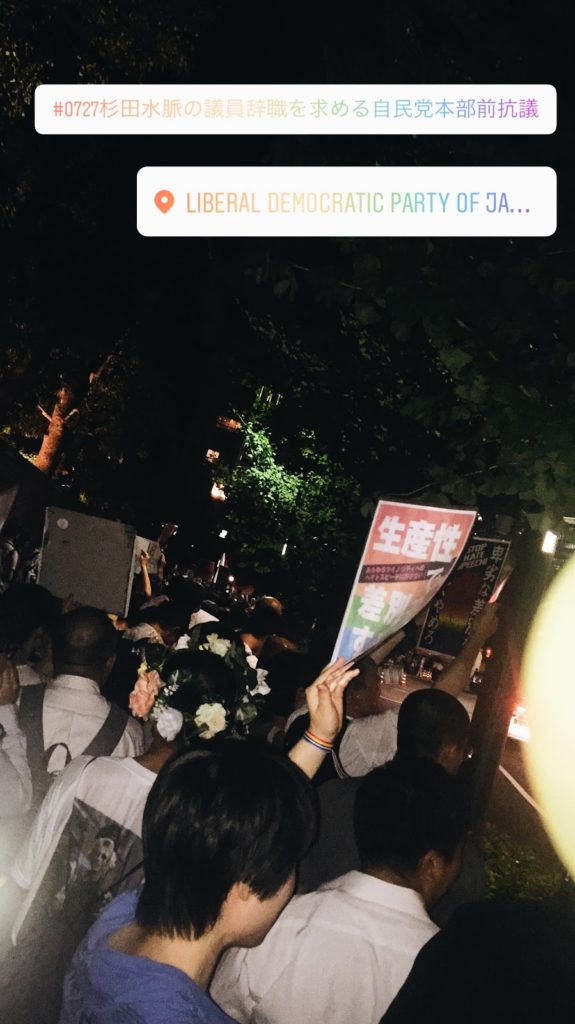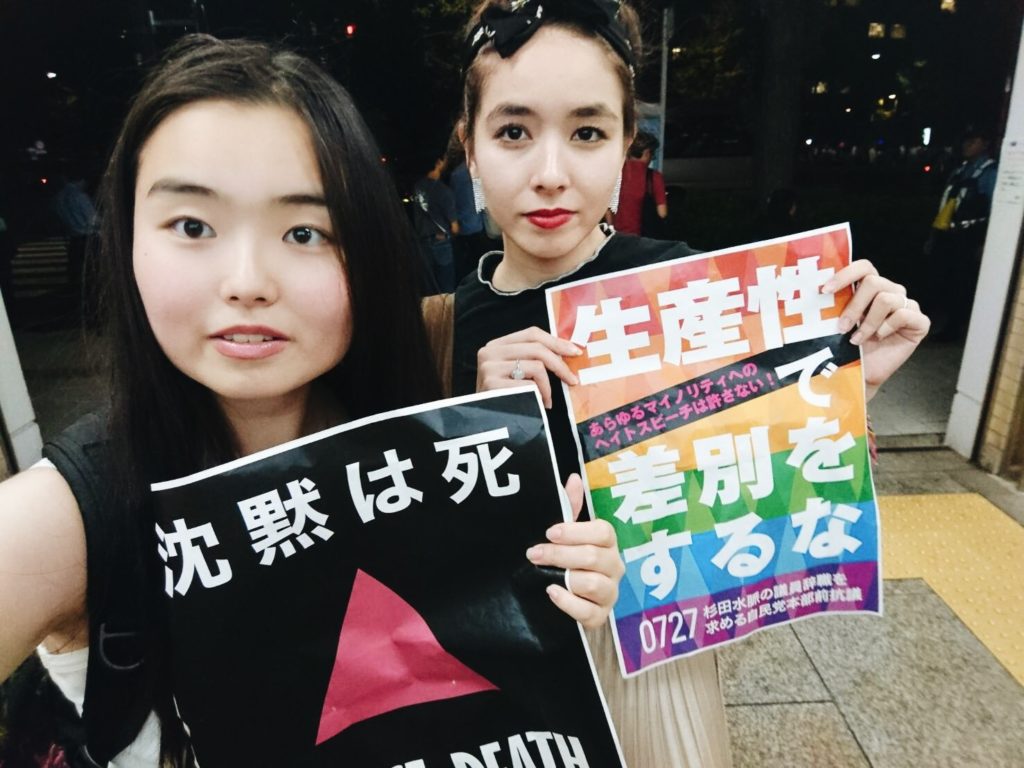
“We don’t need Parliamentarians who ignore human rights” (人権無視する議員はいらない)
“Mio Sugita, resign now” (杉田水脈は今すぐ辞めろ)
“Silence is death” ˆ(沈黙は死)
These were just some of the statements protesters were chanting in unity, in front of the Liberal Democratic Party headquarters on July 27th, demanding for the resignation of the parliamentarian, Mio Sugita. On July 24th, in the monthly magazine, Shukan Shincho, Sugita published an essay in which she said, among many other offensive things, that no tax money should be spent on lesbians, gays, bisexuals, and transgender (LGBT) individuals because “they can’t reproduce and are therefore not valuable to society.” At first, the protests were confined to the internet, but in a short time, they spilt out into real life–an actual protest, and that was pivotal in getting the Japanese media to pay attention and finally force the LDP to address the issue.
Individuals- active citizens, representatives of NGOs as well as some politicians all gathered together in front of the LDP, angered by Mio Sugita’s comments clearly dissing the LGBTQ+ community.
It seems to be that an eclectic variety of individuals gathered. Those who identify to be LGBTQ+, those who do not, students and surprisingly (in the context of Japan,) a few people seemingly salarymen who came after work in their suits. To me, it seemed like there was an equal ratio of women to men. The crowd was mostly Japanese but there were a handful of foreigners who came to show support too. There were young women angered, who came alone, university students who came with their friends including myself. I believe there were a lot of men who seemed to be in their thirties to forties too. The crowd was very diverse.
There were all kinds of posters and signs held. There were many posters available online and they spread through social platforms such as Twitter. There was an identification number for the posters one could then input in a machine at a convenience store and get printed out. There were rainbow flags held up and most of the posters advocated for acceptance of diversity, lgbtq+. Some of these signs had statements like 生産性で価値を図るな which translates to something like Don’t measure our worth by “productivity.” Many of them criticised Sugita’s comment un “unproductiveness” and how it discriminates against many other groups of people in society. One thing which came a little of a shock to me were some other posters which came off as more aggressive. It wasn’t a majority but there were a handful of people with posters with Sugita’s face on it, however with a little twist. Some of them had a target on her face or one which made her look like a zombie, strongly demonizing her. I personally think this is going a little far and it’s better to argue against her comments and advocating for diversity but various perspectives were apparent.
There were countless numbers of policemen trying to control the people so that the participants were not standing over the studded part of the pedestrian road which is an aid for the blind. The police were trying to control the number of people in the main street and restricted participants from going onto the main street. The police were making some people stand against streets going around other blocks to limit the demonstration, but eventually, people overflowed onto the main street.
This issue may have caught a lot of people’s attention because many individuals saw this not only as an attack on the LGBTQ+ community but as one to all citizens, one to women, men, disabled people or the elderly. Sugita’s comments about how LGBTQ+ individuals are “unproductive” (生産性がない) as “they cannot have children” is inaccurate and extremely discriminatory to everyone as childbearing is an autonomous choice of an individual, not an obligation a citizen has to its government.
So, what exactly happened at the demonstration?
Apart from trying to get the attention of the LDP, the media and the rest of the public by simply being there and protesting, some participants, such as LGBTQ+ individuals, a few university professors, and some politicians delivered speeches explaining how hurtful Sugita’s comments were personally, how they could not sleep for days, illuminating how backwards Japan still is. Some participants also went up to the LDP to hand in a sort of a request for the resignation of Mio Sugita. Even though the few individuals who went up to the LDP headquarters seemed to contain their composure, they were denied a chance to even simply hand in the documents.
This demonstration was certainly not one the LDP could simply dismiss and move on with as they often do. There has been a lot of backlash to Sugita’s discriminatory comments on various social platforms and many other demonstrations have popped up in other parts of Japan. Recently, there was one on August 5th in Shibuya, Osaka and Fukuoka. There was also one on August 6th in Mie prefecture.
The LDP did acknowledge Sugita’s comments but have not condemned her, except for Shigeta Ishiba, who is running against Abe in the LDP internal party elections. Although modern Japanese governments prior to the current one have certainly not been the most transparent and democratic, the current one under Prime Minister Abe has continuously been moving far and far away from democracy, with its powerful members pulling strings in their favour, ultimately guiding the government away from democratic rule. It is does not bode well that since Abe took office Japan has dropped to 67 in World Press Freedom (it was ranked 11 in 2011) and not surprisingly Japan ranks lower than ever in the annual gender equality rankings, 114 out of 144 countries.
Erika Bulach is a university student in Tokyo majoring in social sciences.

